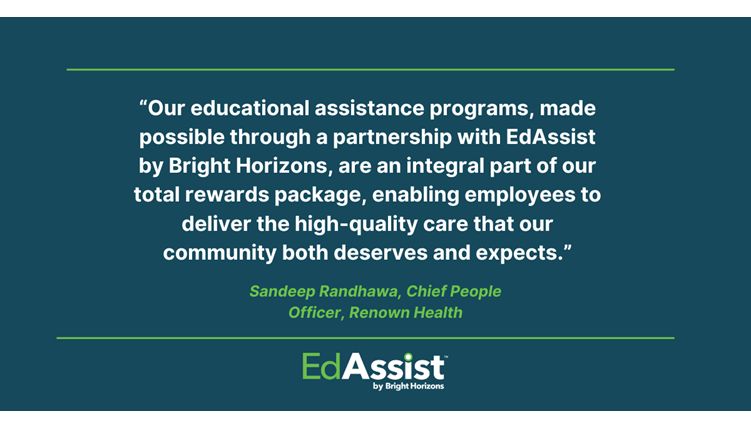The healthcare industry is facing a massive staffing crisis. They’re struggling to both attract and retain workers, and skilled medical roles are among the most difficult to fill.
Hospital systems are already struggling with shortages of nurses, physical therapists, lab technicians, respiratory therapists, and even physicians, and these challenges will likely only become more dire in the coming years. Mercer projects that there will be a nationwide deficit of 100,000 healthcare workers by 2028, which will strain healthcare systems further and make it difficult to keep up with patient care demand.
Healthcare organizations know that they need more talent, and that it takes time to train and certify medical workers. Many are turning to continued education programs that create upskilling and reskilling opportunities that can convert non-healthcare workers into skilled healthcare talent.
Factors contributing to healthcare labor shortages
Multiple factors are contributing to the current and projected healthcare labor shortages.
An immediate contributing factor is the number of healthcare workers leaving the industry.
Clinicians are reporting higher levels of burnout, driving them to leave their careers or patient care, even if they find it meaningful. There are also a large number of healthcare workers retiring, with over 20% of nurses alone currently projected to retire within the next five years.
As healthcare workers are leaving in droves due to burnout and retirement, we also don’t have enough prospective workers entering the education pipeline. Data from McKinsey consistently shows gaps between the number of new degree or certificate completions and the number of workers needed in critical roles like nursing, specialty care, primary care, pharmacy, and EMS, with significant projected shortages by 2031.
The healthcare industry, therefore, needs to attract more workers to obtain the training and certification needed to become skilled medical workers. Fortunately, one of the biggest untapped sources of potential talent is your organization’s non-healthcare frontline workers.
Creating reskilling programs for frontline workers
Hospital systems have a large number of frontline workers who are often working in non-healthcare positions. This may include cafeteria workers, housekeeping workers, gift shop attendants, and patient transportation aides. These jobs are often considered entry-level and have hourly pay.
While every role in the healthcare system matters a great deal, it’s often easier to replace frontline workers than skilled medical talent. And in many cases, the data is clear: Frontline workers want career advancement opportunities.
A 2022 McKinsey study of more than 2,100 frontline workers found that over 70% had applied to career advancement opportunities during their careers. The same survey found that while frontline workers were highly motivated, they faced additional obstacles that could impact their success. To succeed, 75% said they needed learning opportunities, and 75% said they needed an aligned skill set.
How Renown Health creates internal talent pipelines
While many frontline workers want more skill development opportunities, they may not be sure of where to start, and they may not be able to afford continuing education. Employer-sponsored continued education programs can address these obstacles, and Renown Health’s educational assistance program through EdAssist is the perfect example.
Renown Health’s debt-free education program, focused on enhancing skills to improve career mobility, provides equal access for part time, per diem, and full-time employees. This people-first strategy created internal pipelines for critical roles through upskilling and leadership development to advance careers, resulting in a retention rate of 90% among employees who participated.
Healthcare systems can create dedicated reskilling programs for non-healthcare workers that are designed to facilitate skill development and certification so they can eventually fill skilled medical roles.
How continued education programs facilitate upskilling
Education assistance programs can cover the costs of your workers’ tuition, training, and certification, eliminating financial barriers that may prevent non-healthcare workers from reskilling to ultimately fill healthcare roles.
One Renown Health employee changed job 3x with continued education opportunities through their program:
To increase the adoption of these benefits, however, we strongly recommend that healthcare systems develop comprehensive programs that account for other obstacles that may prevent non-healthcare workers from taking advantage of these opportunities.
Some frontline workers may not know which roles or programs are available to pursue. Someone who prefers minimal interaction with patients, for example, might not be enticed by popular nursing career options. Realizing they can complete an associate’s degree to become a lab technician for a significant pay raise, however, could be more appealing.
Creating dedicated career pathways designed to guide non-healthcare frontline workers through the process to become skilled talent is essential. Workers can clearly see what education and certification requirements they need to complete in order to be qualified for specific roles. This can increase participation, and you can create pathways that prioritize the roles you most desperately need to fill.
Leveraging employee education assistance to create the talent you need
While there are multiple factors impacting healthcare talent shortages, perhaps the most significant is that there aren’t enough prospective workers entering the education pipeline. This will increase labor shortages as current employees leave the workforce, making it difficult for organizations to keep up.
Attracting new top talent won’t be enough, which will make upskilling and reskilling your existing workforce an essential staffing strategy over the coming years. And while many healthcare systems will focus on upskilling existing healthcare workers (such as facilitating the development of a registered nurse to a nurse practitioner), it’s imperative to remember your non-healthcare workforce.
Fill your talent pipeline with EdAssist
Non-healthcare frontline workers are often highly motivated, and holistic continued education programs and dedicated career pathways can help you reskill these employees so they can fill your most in-demand medical roles. Ensure that these workers are familiar with any education assistance benefits available to them and that you offer as many resources as possible to help them get started.
Ready to get started? Let us help you develop custom programs and healthcare pathways that address your talent needs.



.ashx?as=1)


